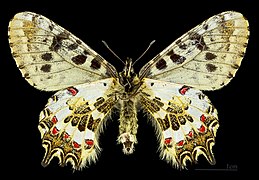Balkan Easter Luzei butterfly
| Balkan Easter Luzei butterfly | ||||||||||||
|---|---|---|---|---|---|---|---|---|---|---|---|---|

Balkan Osterluzeifalter ( Zerynthia cerisy ) |
||||||||||||
| Systematics | ||||||||||||
|
||||||||||||
| Scientific name | ||||||||||||
| Zerynthia cerisy | ||||||||||||
| ( Godart , 1824) |
The Balkan Osterluzeifalter ( Zerynthia (Allancastria) cerisy ), also called Östlicher Osterluzeifalter , is a butterfly from the family of the Knight Butterfly (Papilionidae). The epithet honors the French entomologist Alexandre de Cérisy .
features
butterfly
The wingspan of the moth is about 55 to 60 millimeters. The basic color is usually milky white to pale yellow. The forewings have a pattern of various black bars, ribbons and spots. The edge of the wing is drawn dark undulating. On the hind wings there are red and blue dots of different intensities on the inside of the wave drawing. A short tail on the outer edge in the middle of the wing is typical of the species. The underside shows a pattern of black spots on the front edge and red spots on the outer edge. The dark body of the moth shows reddish or orange spots on the sides of the abdomen. The legs are brown in color.
Caterpillar
Adult caterpillars are cylindrical and usually blackish in color. Light specimens are rare. On each body segment there are several skin cones provided with short bristles. These are reddish, yellowish or brownish.
Similar species
- Osterluzeifalter ( Zerynthia polyxena )
- Spanish easter luce butterfly ( Zerynthia rumina )
The two types mentioned above are usually stronger and more colorful in their overall appearance. Since they lack the tails on the outer edge of the hind wings, they can be clearly distinguished.
These two species show a comparable pattern and a similarly light basic color, but they also lack the tails on the outer edge of the hind wings or these are only hinted at. Since Zerynthia cretica is also endemic to Crete , where Zerynthia cirsy is absent, there is no geographical overlap between these species.
- Zerynthia deyrollei also has a tail on the outer edge of the hind wings, but it differs in its yellow legs.
distribution and habitat
The distribution of the Balkan Easter Butterfly includes parts of Southeastern Europe, Cyprus , Turkey , Israel , Lebanon as well as Iran and Iraq . The species prefers to colonize hot, dry, open grass, meadow or bush landscapes.
Way of life
The main flight time of the univoltine moths are the months April to June. The caterpillar feeds on various types of pipe flowers ( Aristolochia ) and pupates in late summer into a girdle pupa , which then hibernates.
swell
Individual evidence
- ↑ Tom Tolman, Richard Lewington: The butterflies of Europe and Northwest Africa , Franckh-Kosmos Verlags-GmbH & Co, Stuttgart 1998, ISBN 3-440-07573-7
literature
- Lionel G. Higgins, Norman D. Riley: The butterflies of Europe and Northwest Africa . 1st edition. Paul Parey, Hamburg / Berlin 1978, ISBN 3-490-01918-0 .
- Tom Tolman, Richard Lewington: The butterflies of Europe and Northwest Africa , Franckh-Kosmos Verlags-GmbH & Co, Stuttgart 1998, ISBN 3-440-07573-7
Web links
- Lepiforum e. V. Taxonomy and Photos
- www.schmetterling-raupe.de Photos
- Zerynthia (Allancastria) cerisy at Fauna Europaea. Retrieved December 29, 2012




